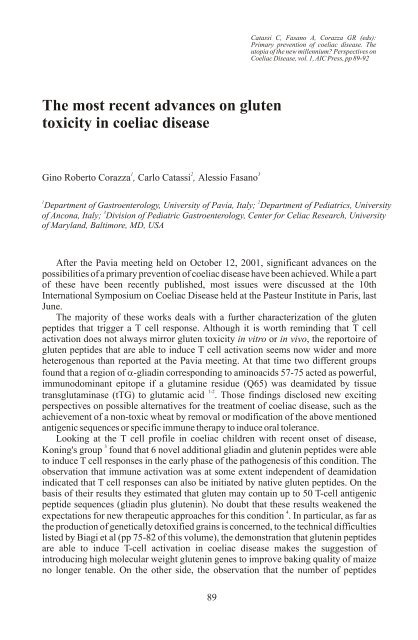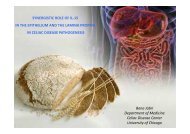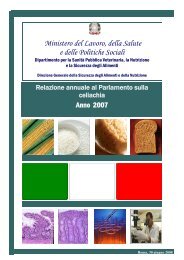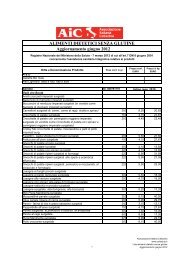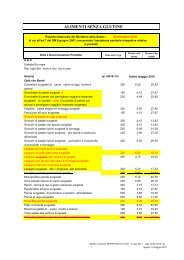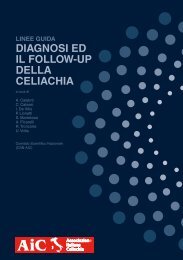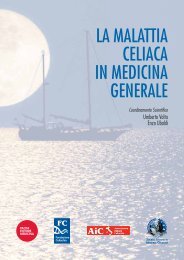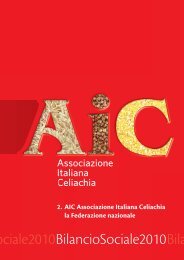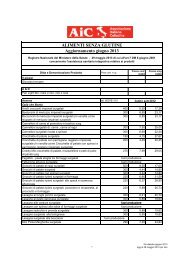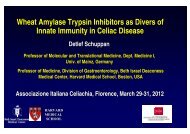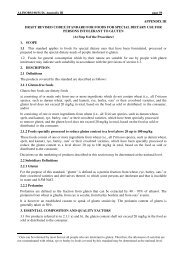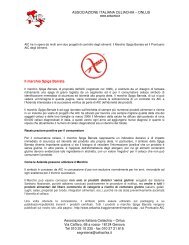primary prevention of coeliac disease - Associazione Italiana ...
primary prevention of coeliac disease - Associazione Italiana ...
primary prevention of coeliac disease - Associazione Italiana ...
You also want an ePaper? Increase the reach of your titles
YUMPU automatically turns print PDFs into web optimized ePapers that Google loves.
Catassi C, Fasano A, Corazza GR (eds):<br />
Primary <strong>prevention</strong> <strong>of</strong> <strong>coeliac</strong> <strong>disease</strong>. The<br />
utopia <strong>of</strong> the new millennium? Perspectives on<br />
Coeliac Disease, vol. 1, AIC Press, pp 89-92<br />
The most recent advances on gluten<br />
toxicity in <strong>coeliac</strong> <strong>disease</strong><br />
1 2 3<br />
Gino Roberto Corazza , Carlo Catassi , Alessio Fasano<br />
1<br />
Department <strong>of</strong> Gastroenterology, University <strong>of</strong> Pavia, Italy;<br />
2<br />
Department <strong>of</strong> Pediatrics, University<br />
3<br />
<strong>of</strong> Ancona, Italy; Division <strong>of</strong> Pediatric Gastroenterology, Center for Celiac Research, University<br />
<strong>of</strong> Maryland, Baltimore, MD, USA<br />
After the Pavia meeting held on October 12, 2001, significant advances on the<br />
possibilities <strong>of</strong> a <strong>primary</strong> <strong>prevention</strong> <strong>of</strong> <strong>coeliac</strong> <strong>disease</strong> have been achieved. While a part<br />
<strong>of</strong> these have been recently published, most issues were discussed at the 10th<br />
International Symposium on Coeliac Disease held at the Pasteur Institute in Paris, last<br />
June.<br />
The majority <strong>of</strong> these works deals with a further characterization <strong>of</strong> the gluten<br />
peptides that trigger a T cell response. Although it is worth reminding that T cell<br />
activation does not always mirror gluten toxicity in vitro or in vivo, the reportoire <strong>of</strong><br />
gluten peptides that are able to induce T cell activation seems now wider and more<br />
heterogenous than reported at the Pavia meeting. At that time two different groups<br />
found that a region <strong>of</strong> a-gliadin corresponding to aminoacids 57-75 acted as powerful,<br />
immunodominant epitope if a glutamine residue (Q65) was deamidated by tissue<br />
1-2<br />
transglutaminase (tTG) to glutamic acid . Those findings disclosed new exciting<br />
perspectives on possible alternatives for the treatment <strong>of</strong> <strong>coeliac</strong> <strong>disease</strong>, such as the<br />
achievement <strong>of</strong> a non-toxic wheat by removal or modification <strong>of</strong> the above mentioned<br />
antigenic sequences or specific immune therapy to induce oral tolerance.<br />
Looking at the T cell pr<strong>of</strong>ile in <strong>coeliac</strong> children with recent onset <strong>of</strong> <strong>disease</strong>,<br />
3<br />
Koning's group found that 6 novel additional gliadin and glutenin peptides were able<br />
to induce T cell responses in the early phase <strong>of</strong> the pathogenesis <strong>of</strong> this condition. The<br />
observation that immune activation was at some extent independent <strong>of</strong> deamidation<br />
indicated that T cell responses can also be initiated by native gluten peptides. On the<br />
basis <strong>of</strong> their results they estimated that gluten may contain up to 50 T-cell antigenic<br />
peptide sequences (gliadin plus glutenin). No doubt that these results weakened the<br />
4<br />
expectations for new therapeutic approaches for this condition . In particular, as far as<br />
the production <strong>of</strong> genetically detoxified grains is concerned, to the technical difficulties<br />
listed by Biagi et al (pp 75-82 <strong>of</strong> this volume), the demonstration that glutenin peptides<br />
are able to induce T-cell activation in <strong>coeliac</strong> <strong>disease</strong> makes the suggestion <strong>of</strong><br />
introducing high molecular weight glutenin genes to improve baking quality <strong>of</strong> maize<br />
no longer tenable. On the other side, the observation that the number <strong>of</strong> peptides<br />
89


